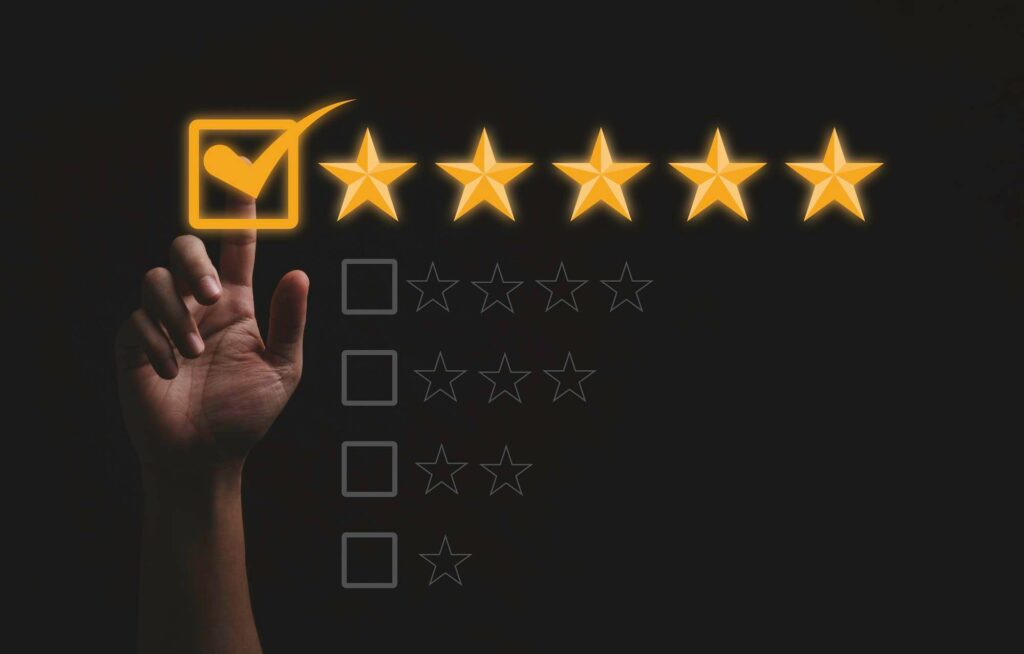How to ask for a review should be the question on the mind of any business owner. Online reviews are more than just a means for customers to voice their thoughts on a product or service.
Reviews can also have an impact on a company's search ranking. They can also be used as marketing tools to boost reputation and revenue.
If you're a business owner who is new to online reviews, this guide will help you understand why they're important and how you can handle them.
Why is it important to know how to ask a customer for a review?
Positive online reviews can significantly benefit your business. They contribute to the development of your internet reputation, greatly increase brand trust, and offer the type of social proof required to affect consumer behavior.
The truth is that what other people have to say about your company (even if they are complete strangers) is more reliable than what you have to say about it. Not persuaded? Look at these statistics from online reviews:
- Online reviews are trusted by 84% of consumers as much as personal recommendations.
- Improving your review star rating by 1.5 points might result in 13,000 additional leads.
- Each one-star rise in a Yelp rating results in a 5-9% increase in ROI.
Having more reviews is of course better than having fewer reviews unless the majority of your reviews are not positive. Having a few reviews is preferable to having none at all.
- According to Online Reviews Statistics, 4 out of every 5 Americans check online reviews before making a purchase decision.
- 79% read reviews to ensure the product or service is good, 61% read reviews to ensure the product or service works, and 53% read reviews to ensure they are not duped.
- Every month, 83% of shoppers discover new products through reviews. Furthermore, 7% of buyers want at least 20 reviews before placing sufficient trust in a company.
Reviews are also one of the key elements affecting a business's local SEO. From this point of view, learning how to ask for customer reviews and guarantee a consistent flow of more and better ratings makes commercial sense.
After all, if you're already giving clients great experiences, they won't hesitate to recommend you. You only need to ask. This is frequently the finest strategy to how to ask a customer for a review.
As long as you're not being unduly pushy or asking for a reward (quid pro quo), asking for customer evaluations is a tactic that can help businesses of all shapes and sizes.

When to ask customers for a review?
To receive more reviews, you should optimize the best time to ask your clients for a review. The hours of 2-3 PM and 6-7 PM are the two ideal periods to ask for reviews.
Consumers are specifically reviewing their experiences during these times because they frequently visit businesses during their lunch break or after work.
When should you not request a review? Almost no one writes reviews between the graveyard hours of 2 AM and 3 AM. This makes a lot of sense, although it's strange that more night owls are writing reviews between 3 and 4 in the morning.
But what's fascinating is that review generation is somewhat slow in the morning, from when individuals get up (say, between 6 and 7 AM) until lunchtime (somewhere between 12 and 1 PM), at least in comparison to the amount of review-writing activity that takes place after lunch.

How to ask for a review from customers? Most Effective Methods
There is no getting around the awkwardness of asking your customers to post a review. But you simply don't get what you don't ask for.
In fact, 68% of users who are asked to provide a review do so gladly, proving that most users are more than willing to comply.
Whether you want to enhance your Google reviews, Facebook five-star ratings, Yelp ratings, or Amazon reviews, there are a variety of approaches to get reviews. Some of these methods include:
- Text
- Landing pages
- Social media
Also read: Seven Consumer Research Methods; 2022 Version
How to ask for reviews by text?
Mobile devices account for 56% of all online reviews. There is a higher likelihood that customers will click on a link in an SMS survey or review request than in an email.
Email normally has a 40 to 50% open rate, however, text messages are opened at a rate of 98%. 90 percent of SMS messages are read within three minutes, according to additional studies.
If you decide to go this route, you will have different options:
- "Thank you for being our customer."
This simple template is excellent for getting you started. Your customer doesn't have to share too much information or go through much effort in order to leave a review. The message can go about something like:
"Hello (First Name of Customer), we're grateful that you stopped by (Business Name) today! Please click on this link (review website profile link) and respond to one question about your experience today so that we can best serve you and others. Thanks!"
- "Please review our location."
Thank your clients for coming to your store or neighborhood branch, and also request a review.
"Hello (First Name of Customer), thank you for visiting our shop/branch in (City). We at (Business Name) want you to have the greatest experience possible! Please take a moment to provide comments to assist us. To review, go here (review website profile link). Thank you very much."
- "Your opinion is important to us."
Allowing your consumer to feel like they have a voice will help you build a stronger relationship with them.
"Hello (First Name of Customer), Your opinion is very important to us. Could you please take a minute to provide us with some feedback on your recent visit to (Business Name)? This link will lead you to a three-question survey. We appreciate your help!"
Ask a customer for a review via Email
Another brilliant business practice is to email customers and request reviews.
Email is still a tremendous medium for reaching out to your clients: 58% of people check their email before doing anything else online, and 91% of consumers view their email daily.
Whether it's a personal email or an email blast, you can ask for reviews via email. You may wish to send out a single, comprehensive email or divide it up into different sections as necessary. These templates are easy to use:
- Personal request
In this format, you will address the customer with their first name and ask them for a favor. This way, they feel closer to you and therefore more inclined to review your business.
Hello [first name],
We have a quick request. Could you please go to [platform] and provide a quick review?
Reviews help us stay on top of your needs, and they also help others like you in making informed decisions regarding [your topic].
Hope to see your happy face soon,
We still love you, review or no review!
[Name]
- The email blast template
This email template can be mass sent to all of your customers to ask them for a review.
Hello, everyone!
Positive reviews from amazing clients like you give other [athletes, parents, artists, etc.] the confidence to choose [company name]. Could you please spend 60 seconds going to [link to review platform] and sharing your positive experiences?
We will be eternally thankful. Thank you in advance for your help!
Ask for reviews via Landing pages
Although it might seem obvious, you'd be shocked at how few companies actively ask customers for reviews through their websites. Consider your website to be the premier location for your business; it is where all traffic should converge.
You may be interested in Ultimate guide: product sampling strategies, methods & techniques
- Dedicated Review Page
Many businesses decide to include a dedicated review page so that it doesn't detract from their main message because your website's main goal is to teach potential clients about what you do and secure those conversions.
- Call to Action
How should you ask for a review from customers on your website? Including clear call to action (CTAs) buttons is the best course of action. To ensure that your clients don't miss them, these should be obvious and simple to find. Don't feel limited to placing it only on your testimonials page; make sure to include it in other locations as well.
How to ask for reviews via Social media?
Social media is used by hundreds of small businesses to draw in new clients, and 68% of users go straight to your social media profile to read your reviews and get a sense of your operation.
The reviews featured on your page may seem more genuine because these platforms provide a more relaxed browsing experience than a formal website.
In fact, 78% of Facebook users are directly impacted by brand posts, while 81% of users are swayed by recommendations from their friends. There are 2 examples you can get inspiration for how to ask for a review:
- Directly ask with a link
What better approach to get Facebook reviews than to publish a post on Facebook? For instance, you can write something like:
"Your opinion matters to us, leave us a review!"
- Show off your current reviews
Another option is to share reviews as they come in on your feed. You can post about your recent reviews and include a link where people can leave their own reviews.
Final words: How to respond to customers who have left reviews?
Once you've gotten the review-asking process on the roll, it's time to make the most of your reviews. Responding to them is the first step.
Indeed, all reviews ought to be respected and not taken for granted. You should be concise and genuine when thanking the reviewer. Then, for further marketing objectives, you should incorporate a call to action.
Why is responding to reviews so important?
- Build up and Show Off Your Relationship
Making your current customers feel appreciated by responding to reviews is a simple method to increase the likelihood that they will become repeat customers.
Reviews can also be an excellent form of advertisement. Prospects will know that you care about your clients and are working to build strong relationships with them if they observe you positively interacting with them through reviews.
- Show Off Your Great Customer Service
Negative reviews are unavoidable. However, they can also be a chance to show potential customers that you're willing to empathize with them, provide an apology, and find a solution.
- Improve SEO
Regularly responding to reviews with unique and fresh content boosts SEO and helps you rank higher on search engines. Plus, using keywords you want to be associated with your brand in all of your responses helps you control your SEO.
Also read: Experiential Marketing: Taking Your Business to the Next Level
How to Respond to Positive Reviews:
- Always respond to positive reviews, they are equally as important as negative ones.
- Say "thank you" to your customer for trusting you with their vehicle and taking the time to write you a positive review.
- Respond to specific details in their review to demonstrate you have read it and are taking their thoughts into consideration.
- If the reviewer mentions a Service Advisor or Technician by name, always respond by saying how thankful you are to have that person as part of your team and how much you value their efforts.
- Incorporate your company values in your response where appropriate. For example, "Helping families eat healthier is one of our core values."
- Close your response with a friendly send-off and assume the reviewer will visit you again: "We look forward to seeing you on your next visit."
How to Respond to Negative Reviews:
- If a mistake was made on your part, take full responsibility for your fault and apologize for not meeting expectations.
- Present facts, and never make assumptions.
- Weave in your superior customer satisfaction scores where appropriate: "We have 500 reviews with a 4.9 rating, and we expect a better experience for our customers."
- If it makes sense, mention your key certifications: "Our work is performed by ASE Certified Master Technicians."
- Provide a solution and a productive next step.
- Leave your name and contact information.
- Before you respond, reread your message and remove anything that sounds defensive or emotional.
Online reviews are becoming more and more popular, which has given businesses new chances to connect with customers.
Online reviews are generally beneficial for business, despite the fact that it's natural to be cautious of online environments where consumers may easily turn into haters.
They're a fantastic resource for learning and may assist you in providing experiences that delight customers and encourage repeat business. Learning how to ask for a review will always pay off!




